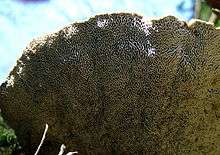labyrinthine
English
WOTD – 23 November 2011

The labyrinthine underside of the fungus Daedalea quercina.
Pronunciation
- IPA(key): /læb.əˈɹɪn.θɪn/, /læb.əˈɹɪn.θin/, /læb.əˈɹɪn.θaɪn/
,Audio (US) (file) Audio (US) (file)
Adjective
labyrinthine (comparative more labyrinthine, superlative most labyrinthine)
- Physically resembling a labyrinth; with the qualities of a maze.
- 1996, Steen L. Jensen, H. Gregerson. M. H. Shokouh-Amin, F. G. Moody, (eds.), Essentials of Experimental Surgery: Gastroenterology, page 27/4
- In the pyloric canal, muscular ridges are more fixed than elsewhere and produce quite a labyrinthine surface.
- 2011, Lincoln Child, Deep Storm, page 185
- Crane trotted along the labyrinthine corridors of deck 3, accompanied by a young marine with close-cropped blond hair.
- 1996, Steen L. Jensen, H. Gregerson. M. H. Shokouh-Amin, F. G. Moody, (eds.), Essentials of Experimental Surgery: Gastroenterology, page 27/4
- (figuratively) Convoluted, baffling, confusing, perplexing.
- 1996, Roger Ebert, Review of "American Buffalo":
- Mamet, like one of his characters, invents a labyrinthine, convoluted spiel leading nowhere, and like a magician distracts us with his words while elaborately not producing a rabbit from his hat.
- 2000, Joseph J. Ellis, Founding Brothers: The Revolutionary Generation, page 51
- Any attempt to answer that question would carry us into the labyrinthine corridors of Jefferson's famously elusive mind.
- 2005, Michael W. Riley, "Plato's Cratylus: Argument, form, and structure", page 103
- By coupling "essence" with "name" within a series of contraposed pairs of names, Socrates indicates the point to which he thinks his labyrinthine argument has led so far in the Cratylus.
-
Synonyms
- (resembling a labyrinth): labyrinthal, labyrinthial, labyrinthian, labyrinthic, labyrinthical, labyrinthiform
- (twisting, convoluted): baffling, confusing, convoluted
Related terms
Translations
physically resembling a labyrinth
|
|
twisting, convoluted, baffling
|
|
This article is issued from
Wiktionary.
The text is licensed under Creative
Commons - Attribution - Sharealike.
Additional terms may apply for the media files.